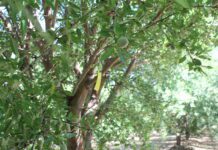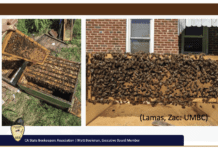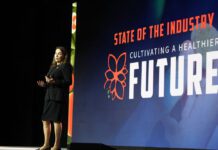
Safety manager Betty Chavez walks through The Almond Company’s vast processing plant near Madera, Calif., pointing out what’s different since the COVID-19 pandemic brought new restrictions last March.
Every employee, from processing-line worker to forklift driver to floor sweeper, wears a mask. Each keeps six feet away from others to prevent the spread of the virus. Break-area tables offer only two chairs, one at each end, to meet physical distancing requirements. Where there were once three clock-in stations, there are now only two, separated to keep employees from standing too closely together when they punch in or out. Lines leading to the clocking stations also are marked for social distancing. Signs calling for mask-wearing are posted throughout the 420,000-square-foot plant.
While The Almond Company doesn’t do temperature checks on employees, it does require them to answer a daily health-check questionnaire before starting their shifts. Employees also must wash their hands with soap and water before entering the facility. Further, hand sanitizer is located in break-rooms, near doors, clock-in stations, the front lobby and office hallways. In the front lobby, security director Joseph Reyes monitors video footage on multiple computer screens to see what’s going on throughout the plant.
All combined, these measures have succeeded in keeping COVID-19 at bay at The Almond Company, one of California’s largest almond handlers. The operation has had no COVID-related deaths among employees. Only two out of the 120 who work at this plant have tested positive for the virus since March.
“And those cases were contracted from family members, not here on the job,” says Chavez.

Taking It Seriously
There’s a simple explanation for The Almond Company’s success in avoiding a COVID-19 outbreak, says Roger Isom, president and CEO of Western Agricultural Processors Association (WAPA).
“They took COVID seriously from the start,” Isom says. “Because they did, they haven’t missed a beat during the peak of the season.”
The Almond Company, part of the vertically integrated Harris Family Enterprises, processes more than 100 million pounds of almonds for distribution domestically and internationally each year. As a food-processing facility, the company has always required employees to adhere to strict food-safety protocols, such as donning hairnets and smocks. But the pandemic took its food-safety policies to new levels.
When new COVID-19 restrictions were called for last spring, Chavez had held her safety role for less than a year. Initially overwhelmed, she turned to a health and safety consultant and to WAPA to help her develop new pandemic protocols. She relied on information provided by Cal/OSHA and the Centers for Disease Control and Prevention. She also gathered 18 of the plant’s managers, supervisors and leads for input on the best ways to comply with coronavirus regulations and increase employee awareness.
By April, The Almond Company had developed a seven-page COVID-19 action and preparedness plan. Among other things, it includes holding COVID “tailgates” every other Thursday among the plant’s various departments. These meetings allow managers to seek suggestions and concerns from employees. Out of those meetings came the need for more tables and chairs both in and out of the building and staggered break times to accommodate fewer employees per space.
“Safety is my main priority,” Chavez says. “We take it very seriously. Our goal is to send all employees back to their families safe and healthy.”
In connecting with the plant’s workforce, it helps that Chavez also speaks Spanish, since many of the employees don’t speak English. Some cannot read or write. Chavez relies on her own background to relate. Born in Mexico and brought to the U.S. as a toddler, Chavez grew up in her family’s farm-labor contracting business in the Central Valley near Merced.
Her experience in the fields and bilingual ability help her understand their concerns and boosts communication. Moreover, Chavez uses what she calls “true stories” to underscore the need for COVID-related training and education.
“Early on, there were a lot of processing plants that shut down because of COVID outbreaks,” she says. “We talk about how people were out of work. But we’ve kept our safety and our jobs.”

Staying Vigilant
Adapting to the new pandemic normal hasn’t been easy. Early on, port closures and supply-chain disruptions slowed company shipments. In-house inventories grew for a while before outbound loads began flowing again. But hardest for Chavez have been “non-believers of COVID.”
“They would shake their heads and roll their eyes when we talked about our safety requirements,” she says. “But after a few found out that a family member got COVID, they came and apologized to me.”
If employees are spotted not following COVID-related measures, supervisors speak to them. If the non-compliance continues, the employee gets a write-up in his or her personnel file.
To curb COVID-19, the company also relies on the Silver Dihydrogen Citrate (SDC) disinfectant. SDC kills bacteria, fungus and virus, but it’s non-toxic to humans and animals. A local company sprays SDC two nights a week after employees have left the plant.
Another result of the company’s pandemic vigilance? No visits from Cal/OSHA, which enforces California laws and regulations concerning workplace safety and health. The agency also assists employers and workers in implementing and following rules.
“They’ve been great in helping us,” Chavez said.
The Almond Company has paid for all personal protection equipment for its employees. Chavez won’t say how much that has cost, only that “it’s a large amount of money.” But the price tag isn’t the issue.
“The well-being of our employees doesn’t have a number,” she says. “The money that’s been spent is well worth it.”
Her advice to other tree-nut handlers about coping with COVID-19: Educate employees. Learn their names and let them know they’re doing a good job. And network with other processors to share policies, protocols and resources that benefit all.
“It’s been a hard ride,” Chavez says. “Every day there’s something new. We have to be on top of things. But, here at The Almond Company, we’ve done a great job with our safety measures and employee education.”
















